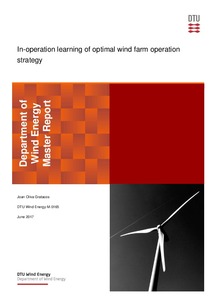Mostra el registre d'ítem simple
In-operation learning of optimal wind farm operation strategy
| dc.contributor | Cutululis, Nicolaos Antonio |
| dc.contributor | Kazda, Jonas |
| dc.contributor.author | Oliva Gratacós, Joan |
| dc.date.accessioned | 2017-12-20T19:23:19Z |
| dc.date.available | 2017-12-20T19:23:19Z |
| dc.date.issued | 2017-09 |
| dc.identifier.uri | http://hdl.handle.net/2117/112344 |
| dc.description.abstract | In a wind farm, power losses due to wind turbine wake effects can be up to 30-40% under certain conditions. As the global installed wind power capacity increases, the mitigation of wake effects in wind farms is gaining more importance. Following a conventional control strategy, each individual turbine maximizes its own power production without taking into consideration its effects on the performance of downstream turbines. Therefore, this control scheme results in operation conditions that yield suboptimal power production. In order to increase the overall wind farm power production, a cooperative control strategy can be used, which coordinates the control actions among the wind turbines in the wind farm. This work further investigates the model-free Bayesian Ascent optimization algorithm using SimWindFarm and a standalone Dynamic Wake Meandering model-based simulation tool An advantage of such optimization approach is that the control strategy adapts to operational conditions in the wind farm and is not model-dependent. An approximation of the wind farm power function is constructed using GP regression to fit the control action inputs and the noisy measured power outputs, which is then maximized to determine the optimal control inputs. This estimation is updated in every iteration, allowing the control system to learn from the target system while performing the optimization. The usage of all historical data, along with a trust region constraint in the sampling of new inputs, contribute to a fast convergence rate with gradual changes of the control actions. The developed learning technique is implemented in a wind farm controller and tested in both SimWindFarm and standalone Dynamic Wake Meandering model-based simulation tools. With the conducted tests, performance of the algorithm is assessed considering the different dynamics in the wind farm, thus obtaining an accurate representation of real farm operation. The developed controller reliably improves farm efficiency, even with uncertainty present in measurements. Compared to traditional control strategies, an increase in total wind farm power production is obtained when using a cooperative control strategy. Such enhancement in wind farm performance would result in an improvement of wind farm economics and hence in further growth of wind-energy based power generation. |
| dc.language.iso | eng |
| dc.publisher | Universitat Politècnica de Catalunya |
| dc.publisher | Denmarks Tekniske Universitet (Technical University of Denmark) |
| dc.rights | Attribution-NonCommercial-NoDerivs 3.0 Spain |
| dc.rights.uri | http://creativecommons.org/licenses/by-nc-nd/3.0/es/ |
| dc.subject | Àrees temàtiques de la UPC::Energies::Energia eòlica |
| dc.subject.lcsh | Wind power |
| dc.title | In-operation learning of optimal wind farm operation strategy |
| dc.type | Master thesis |
| dc.subject.lemac | Energia eólica |
| dc.rights.access | Open Access |
| dc.audience.educationlevel | Màster |
| dc.audience.mediator | Escola Tècnica Superior d'Enginyeria Industrial de Barcelona |
| dc.audience.degree | MÀSTER UNIVERSITARI EN ENGINYERIA INDUSTRIAL (Pla 2014) |


